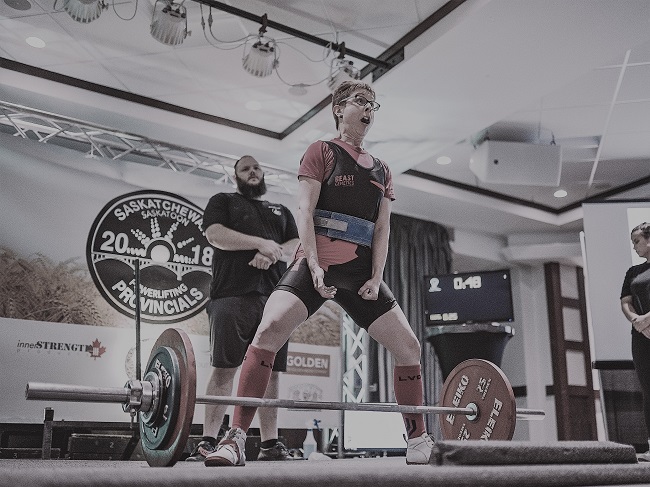
Photo credit: Dillon Jakovac
| Squat PR: |
| 90.5kg official |
| Clean & Jerk PR: |
| 115lbs unofficial |
| Snatch PR: |
| 92lbs unofficial |
| How did you come to powerlifting or Olympic lifting? |
| I was training in distance running but my knees were cranky, I was constantly exhausted, always hungry, and gaining weight. A new gym opened up in town and offered a fitness/nutrition challenge so I decided to give it a try. I fell in love with the barbell and the community around it. |
| Do you have any previous athletic or lifting experience? |
Zero inclination or athletic ability as a kid
10 year in karate – brown belt
A few seasons of distance walking and running – completed two half-marathons |
| Do you compete? Why or why not? If you compete, what do you like most about the competitions? |
| Initially, I only wanted to compete so that I could understand the process for coaching the Special Olympics Powerlifting program I started in my town. I wasn’t very good or very strong but my commitment to the athletes in the program gave me courage, and I did it anyways. I continue to compete because it gives my training focus and it’s fun to see the progress I’ve made. |
| Do you have a coach or trainer? In person or online? How did you find your trainer/program? Do you have any advice for women looking for a trainer? |
| My coach was one of the presenters at a coaching certification workshop I attended. He works with me online, through email and video analysis. Offloading decisions around training plans and nutrition has been a fabulous investment. I really enjoy my training and can just do my best to complete each session with intention and effort.My advice in looking for a trainer is start where you are. You don’t need the most expert coach in the world, you just need someone who knows more about the sport than you and is excited to share that knowledge in a way that resonates with you. Your coaching needs may change over time, as you mature as an athlete. |
| Where do you train? Gym, garage? |
| I train at CrossFit Lair in Unity. I’m kind of an odd-ball, powerlifting at 6am CrossFit classes, but it fits and it works because we all love the barbell and encourage each other in our strength and fitness journeys. |
| What is the hardest part about beginning lifting as an older woman? |
| I think the toughest thing is that I don’t recover with the same speed that younger athletes seem to. Part of that is the many other responsibilities in life – career, kids, volunteering – don’t allow me as much rest as I probably need. But I think part slower recovery can be attributed to age. |
| How has lifting affected your health? |
| Physically, I’m in the best shape of my life. I catch myself by surprise when I see muscle tone and definition in the mirror. But the most powerful effect has been on my mental health. I am happier, kinder, and more confident than I ever thought possible. In lifting, I find joy, community, and a sense of competence that spills into other aspects of my life. |
| What would you tell women just beginning this journey? |
| Love where you are and who you are right at this moment. Have big goals and dreams and work for them in baby steps. Celebrate every pound and kilogram. There is so much joy to be had. My personal training philosophy is to use the “Minimum Effective Dose.” If you’ve been sitting at a desk for years, you don’t need to jump into training 6 days a week. Start with small changes and give yourself room to grow in your training program. Keep your efforts sustainable so you can continue training and being active for the rest of your life.
After all, the goal for most of us isn’t really to bring home gold medals. It’s about being fitter, happier and healthier so that we can have the strength and energy to enjoy life on our own terms. |




